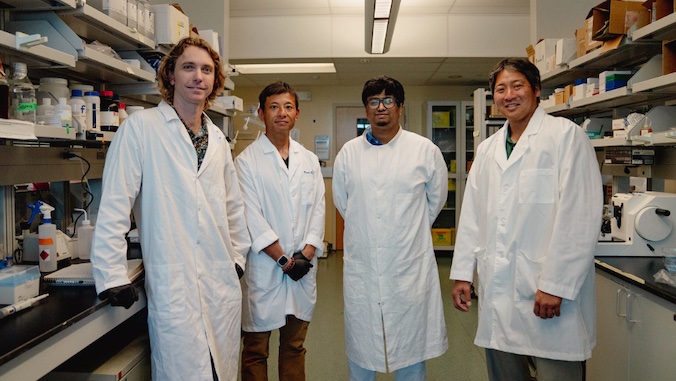
Researchers at the University of Hawaiʻi at Mānoa’s John A. Burns School of Medicine (JABSOM) have achieved a breakthrough in gene editing that could revolutionize the treatment of genetic diseases such as hemophilia. The new technique enables a faster, safer and more efficient delivery of healthy genes into the body, potentially addressing hundreds of genetic conditions.
This research was published in Nucleic Acids Research. The research team is led by Jesse Owens, along with Brian Hew, Ryuei Sato and Sabranth Gupta, from JABSOM‘s Institute for Biogenesis Research and Cell and Molecular Biology Department.
Traditional gene-editing methods, while promising, often struggle with unintended DNA damage because of difficulties in inserting large genetic material, such as whole genes. However, the research team’s method overcomes these challenges by utilizing a specially engineered “super-active integrase” (nucleic acid processing enzyme) that can insert therapeutic genes into the genome with precision and efficiency—achieving success rates of up to 96%.
“It’s like having a ‘paste’ function for the human genome,” said Owens. This advancement allows for the careful insertion of healthy genes without causing DNA breaks, offering hope for more effective and affordable treatments for genetic disorders.
“This could lead to faster and more affordable treatments for a wide range of diseases, potentially impacting hundreds of conditions with a single faulty gene,” added Owens.
Accelerating advanced medical treatment
Beyond gene therapy, this new technique has broader implications for medicine. It can significantly speed up the development of cell lines used in producing therapeutic proteins, which traditionally involves a time-consuming process of randomly inserting genes and then searching for cells that produce the desired proteins.
Owens’ method streamlines the process, delivering genes directly to the desired location in the genome, making the development of biologics and advanced therapies, such as antibodies, more efficient.
“JABSOM takes pride in nurturing talented researchers like Jesse Owens, whose work has the power to create a global impact,” said Sam Shomaker, JABSOM dean. “This research, conducted in our lab in the middle of the Pacific, has the potential to significantly improve the way we treat genetic diseases.”
The JABSOM team continues to explore how this technique can accelerate the development and manufacture of life-saving therapeutics. Owens founded Hawaii Advanced Genetic Medicine Foundation, a 501c3 nonprofit aimed at supporting local research in genetic engineering in Hawaiʻi.

